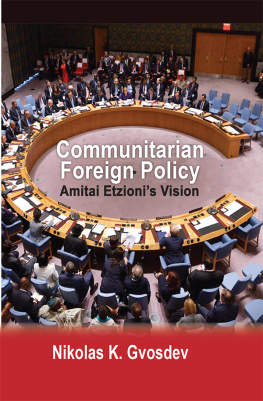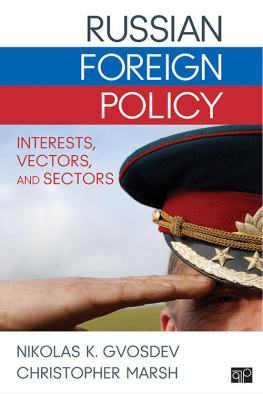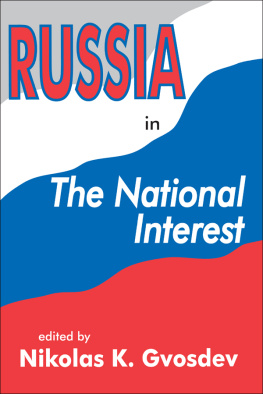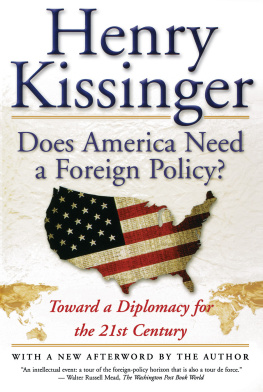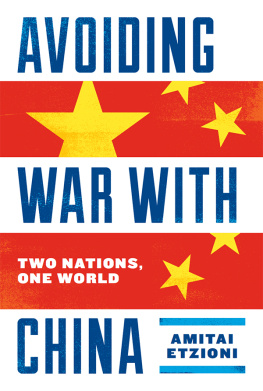Communitarian
Foreign Policy
Communitarian
Foreign Policy
Amitai Etzionis Vision
Nikolas K. Gvosdev
First published 2016 by Transaction Publishers
Published 2017 by Routledge
2 Park Square, Milton Park, Abingdon, Oxon OX14 4RN
711 Third Avenue, New York, NY 10017, USA
Routledge is an imprint of the Taylor & Francis Group, an informa business
Copyright 2016 by Taylor & Francis.
All rights reserved. No part of this book may be reprinted or reproduced or utilised in any form or by any electronic, mechanical, or other means, now known or hereafter invented, including photocopying and recording, or in any information storage or retrieval system, without permission in writing from the publishers.
Notice:
Product or corporate names may be trademarks or registered trademarks, and are used only for identification and explanation without intent to infringe.
Library of Congress Catalog Number: 2015016248
Library of Congress Cataloging-in-Publication Data
Gvosdev, Nikolas K.,
1969-Communitarian foreign policy : Amitai Etzionis vision / Nikolas
K. Gvosdev.
pages cm
Includes index.
ISBN 978-1-4128-6260-8 (acid-free paper) 1. United States--Foreign relations--1989- 2. World politics--1989- 3. International relations--Philosophy. 4. International cooperation. 5. Human rights--International cooperation. 6. Etzioni, Amitai--Political and social views. I. Title.
JZ1480.G86 2015 327.101--dc23
2015016248
ISBN 13: 978-1-4128-6260-8 (hbk)
First and foremost, I would like to thank the Fund for Public Voices for a generous grant that enabled me to take the time to focus on this topic. I also extend my gratitude to Amitai Etzioni, who provided a good deal of assistancefirst, in getting this project off the ground, and especially in locating material and answering questions that helped round out the documentary record. In addition, he scrupulously avoided anything that might even remotely be construed as an effort to influence my conclusions or assessments. Etzioni will read this work for the first time only after it has appeared in print. Needless to say, the interpretations of his writings are entirely my own, and I alone bear full responsibility for what appears in these pages.
I worked on this project in a private capacity, using my own time and resources. The opinions in this work are entirely my own and in no way represent the views of the US Naval War College, the Department of the Navy, the Department of Defense, or the US government. I wish to extend my appreciation to the Naval War College for creating an environment conducive to free academic expression and the study of national security affairs.
Any major intellectual endeavor rests upon the support and assistance of countless others. My thanks go to Jonathan B. Imber, the editor in chief of Society, who asked me to write an overview of Etzionis views and recommendations in terms of U.S. foreign policy. This piece served as the basis for the proposal that became this volume. I am grateful to The National Interest, World Politics Review, and Ethics and International Affairs for the ability to test out ideas and put forward concepts in their pages that have found their way into this book. My deepest appreciation goes to Mary E. Curtis and Transaction Press for agreeing to publish this work. I would also like to express my thanks to the Watson Institute at Brown University for providing me a perch where a good deal of this book took shape.
This work benefited tremendously from the suggestions and comments of a number of colleagues, including Thomas Nichols, Derek Reveron, Paul Smith, David Cooper, Christopher Marsh, Colin Dueck, Ray Takeyh, and Damjan de Krnjevic-Miskovic. Any and all errors in this book are my responsibility alone.
Finally, I want to acknowledge the support and understanding of my familyespecially my wife, Heidi Kranz, and my son, Adrian, particularly during those times when I was consumed by this project.
Contents
I first encountered the foreign policy writings of Amitai Etzioni in 2004. As the executive editor of the journal The National Interest, I had received an advance copy of his book From Empire to Community. I was already well-acquainted with Etzionis work in domestic policy matters, in framing communitarianism as a third-way approach to navigate the divide between big-government statism and a laissez-faire approach. I knew that his ideas helped to provide an intellectual foundation for a number of the policy initiatives undertaken by the Clinton administration in the areas of education, welfare reform, law enforcement, health care, and public service.
Yet communitarianism did not seem to offer much guidance in terms of how the United States (or any other nation) should conduct foreign policy. The landmark November 1991 statement, the Responsive Communitarian Platform, focused most of its attention on the state of affairs within society. At the same time, it expressed a hope that the multiplication of strongly democratic communities around the world might lay the groundwork for the emergence of a global community to deal with pressing transnational issues. Yet, given his prominence as one of the leading members of Americas corpus of public intellectuals, I was curious about what he would have to say about international affairs and Americas role in the world.
There were criticisms that Etzionis domestic prescriptions amounted to middle-of-the-road triangulations between liberal and conservative views. I therefore assumed that his book would be classed with a growing number of works that attempted to square the circle between Kissingerian Realpolitik and Wilsonian idealismthe latest iteration of an effort to create a realistic liberalism or a liberal realism.
Alternatively, I imagined that it would offer a compelling philosophical justification for a pragmatic approach to foreign policy. Instead, From Empire to Community presented a unique argument and perspective.
Etzioni agreed with liberal internationalists that the Westphalian order in world affairs was being eroded and that a new set of global norms was required. However, he maintained that a stable global architecture could not be indefinitely maintained by the fiat of even a global hegemon like the United States, and would only endure if it appealed to the interests of different nations. Etzionis emerging global community was not an idealistic association of nations bound by shared values. Instead, it would come about through the voluntary coordination of states that could not, relying solely on their own resources, combat an increasing array of transnational threats to their security and prosperity. This cooperation would, over time, help to engender the trust that would lay the foundation for forming closer associations. Moreover, a joint effort among states would generate a dialogue on differences in values, as opposed to the imposition of Western preferences on the rest of the world. Cooperation was also something realizable and achievable. It would provide a contrast to the post-Cold War euphoria in which American policymakers were being encouraged to take on very ambitious foreign policy goals and commitments, while assuming that these goals can be met without commensurate cost or expenditure on the part of the United States.
This argument appealed to me. As a graduate student in the 1990s who focused on the politics of the post-Soviet Eurasian states, I was initially caught up in the optimism that accompanied 11/9 (the fall of the Berlin Wall in 1989). Along with others, I anticipated that the end of the Cold War would lead to a world defined by the spread of liberal democracy and a (Western-derived) rules-based international order. However, close (and, in some cases, direct personal) observation of the problems encountered in the successor states of the former USSRand those resulting from the outbreak of the Yugoslav wars of successionled me to a renewed appreciation of the importance of stability and sustainability. This observation also engendered a growing suspicion of vast, even utopian, projects of transformation, which invariably fell far short of the stated objectives and sometimes even made conditions worse. All of this led me to put a greater emphasis on the morality of results rather than the morality of intentions.

